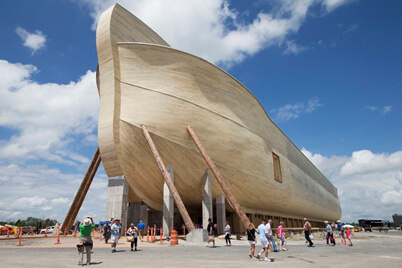https://www.israelnationalnews.com/News/News.aspx/289627 by Yair Yulis
 In this 2016 photo, visitors pass outside the front of a replica Noah’s Ark at the Ark Encounter theme park in Williamstown, Ky. (AP Photo/John Minchillo, File/AP)
In this 2016 photo, visitors pass outside the front of a replica Noah’s Ark at the Ark Encounter theme park in Williamstown, Ky. (AP Photo/John Minchillo, File/AP)
https://www.sun-sentinel.com/florida-jewish-journal/devar-torah/fl-jj-torah-weiss-noach-20211004-5p6qku24pzgvtieax7t4rckgx4-story.html
DISCLAIMER – the authors and promoters of the articles and videos that we place here are mostly not connected in any way to KOL HATOR and may well not share our views and interpretations. We do however thank them for their insight and pointers that confirm our understanding and often broaden our insight.
The world changed after the Deluge. Ours can as well.
Our world is going through many changes. These changes, which previously may have taken decades to actualize, are happening much faster than ever. The Corona virus is also speeding up many changes. I would like to look into the changes that occurred to the world in Parshat Noach and perhaps take some lessons as to where we are going today.
Buy a new computer or hit “restart”?
In Parshat Noach the world was destroyed and everyone (except Noah and family) was killed as a punishment for their immorality and bad deeds. It would seem that this flood and destruction is analogous to doing a “restart” to a computer and trying to renew the world all over again, as if nothing happened. In actuality, if one looks closer, the world before and after the ‘Mabul’ (flood) is not the same place at all. It had changed and has a new format.
Before and After
Before the Deluge, the Mabul, man was not allowed to eat animal meat. After the Mabul, he was promised that he could. Human beings and animals were somewhat equal before the Mabul occurred because animals and all creations were on a higher level. After the Mabul, the world became more spiritual for humanity and the level of the wildlife declined.
Before the Mabul, the land was punished for not obeying Hashem’s commandment to the letter (Rashi Bereshit 1: 12). Hashem commanded the land to grow “fruit trees” and the land created instead “trees that only grow fruit”. After the Mabul, the land became part of the permanent nature of the four seasons and thus no range of free will (Bereshit 8: 22).
The world had too many forces which eventually got out of control, therefore G-d needed to change the character and nature of the world.
Maybe what he is trying to teach us is that we have a chance to fix the world. We have a remaining “nature reserve” of an ancient and unique world that has already been extinct (Jurassic Park?). The Talmud states that in the future the barren trees will give fruit (Ketubot 112). This can be understood as a tikkun (fixing) of the natural law during the time of the creation of the world.
In summary, we are surely heading towards a better world. As the world changes, we must decide what to salvage and what we need to give up on. What’s for sure, though, is that there is great hope to the world.
Shabbat Shalom!
Rabbi Yonatan Kirsch was born in NJ but grew up in Ginot Shomron after his parents moved to Israel. He teaches at the Hesder Yeshiva in Sderot, where he lives with his wife and family, after receiving his semicha from the Chief Rabbinate of Israel. He is author of the book “Ma’alot Hamikve”, published by Dabri Shir, and served as a combat soldier, is a certified tour guide.

